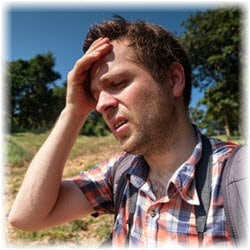What Is the Difference Between Heat Exhaustion and Heatstroke?

According to the CDC (Center for Disease Control), more than 600 people die each year from extreme heat in the United States. That’s more than any other weather events (tornadoes, hurricanes, flooding, lightning) combined. But unlike other weather events, heat-related deaths and illnesses can be prevented.
As temperatures start to rise, consider these preventative tips to keep the body cool:
- Stay indoors or in the shade
- Drink 2-4 cups of water every hour while exposed to heat
- Wear loose, light-colored clothing and a wide-brimmed hat
- Spend part of the day in an air conditioned space, like the mall or a library
- Take frequent breaks when working or exercising outdoors
- Use cooler water for showers and baths
It’s important to recognize the warning signs and react in an appropriate manner. In the simplest terms, heatstroke happens when you don’t address heat exhaustion and it’s a direct result of your body overheating to temperatures of 104° degrees or higher.
Below are lists of different symptoms:
| Heat Exhaustion |
Heatstroke |
| Heavy sweating |
Hot, dry skin |
| Rapid pulse |
Racing heartbeat |
| Dizziness |
Nausea and vomiting |
| Fatigue |
Dizziness or vertigo |
| Cool, moist skin with goose bumps when in the heat |
Altered mental state or behavior |
| Muscle cramps |
Fatigue |
| Nausea |
Rapid breathing |
| Headache |
Convulsions |
“When heat exhaustion is suspected, get out of the sun and cool down by misting the body or using ice packs and loosening tight clothes,” said Michelle Choi DO, a PIH Health family medicine doctor in Montebello, CA. “It’s important to rehydrate by drinking plenty of water but avoid beverages that contain caffeine, alcohol or sugar. If symptoms worsen or do not improve within one hour, get medical attention to prevent heatstroke.”
If you suspect heatstroke, seek immediate medical attention.
Visit PIHHealth.org to learn about Family Medicine at PIH Health and to view Dr. Choi’s physician profile. Call 323.728.0321 to make an appointment with Dr. Choi.